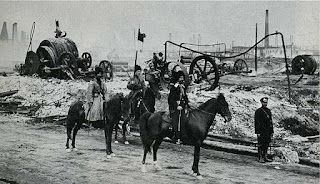Nicolás Gogol describe a los cosacos en su libro Taras Bulba.
Más abajo podés escuchar el uso de Vladimir Putin de los cosacos para mantener el orden en los Juegos de Invierno de Sochi.
“Vamos a salir mañana. ¿Para qué demorar? ¿A qué
enemigo podemos asediar aquí? ¿Qué es esta choza para nosotros? ¿Para qué
queremos todas estas cosas? ¿Qué significan todos estos trastos? Mientras decía
esto pateaba los frascos alrededor… ” (Taras
Bulba renegando de las cosas comunes)
The poor old woman, well used to such freaks on the part of her
husband, looked sadly on from her seat on the wall-bench. She did not dare say
a word; but when she heard the decision which was so terrible for her, she
could not refrain from tears. As she looked at her children, from whom so
speedy a separation was threatened, it is impossible to describe the full force
of her speechless grief, which seemed to shake in her eyes and on her lips
convulsively pressed together.
Bulba was terribly headstrong. He was one of those characters which
could only exist in that fierce fifteenth century, and in that half-nomadic corner
of Europe, when the whole of Southern Russia, deserted by its princes, was laid
waste and burned to the quick by pitiless troops of Mongolian robbers; when men
deprived of house and home grew brave there; when, amid conflagrations,
threatening neighbours, and eternal terrors, they settled down, and growing
accustomed to looking these things straight in the face, trained themselves not
to know that there was such a thing as fear in the world; when the old,
peacable Slav spirit was fired with warlike flame, and the Cossack state was
instituted—a free, wild outbreak of Russian nature—and when all the
river-banks, fords, and like suitable places were peopled by Cossacks, whose
number no man knew. Their bold comrades had a right to reply to the Sultan when
he asked how many they were, "Who knows? We are scattered all over the
steppes; wherever there is a hillock, there is a Cossack."Cosacos patrullan instalaciones petroleras
It was, in fact, a most remarkable exhibition of Russian strength,
forced by dire necessity from the bosom of the people. In place of the original
provinces with their petty towns, in place of the warring and bartering petty
princes ruling in their cities, there arose great colonies, villages, and
districts, bound together by one common danger and hatred against the uncivilized
robbers. The story is well known how their incessant warfare and restless
existence saved Europe from the merciless hordes which threatened to overwhelm
her. The Polish kings, who now found themselves sovereigns, in place of the
provincial princes, over these extensive tracts of territory, fully understood,
despite the weakness and remoteness of their own rule, the value of the
Cossacks, and the advantages of the warlike, unrestrained life led by them.
They encouraged them and flattered this disposition of mind. Under their
distant rule, the hetmans or chiefs, chosen from among the Cossacks themselves,
redistributed the territory into military districts. It was not a standing
army, no one saw it; but in case of war and general uprising, it required a
week, and no more, for every man to appear on horseback, fully armed, receiving
only one ducat from the king; and in two weeks such a force had assembled as no
recruiting officers would ever have been able to collect. When the expedition
was ended, the army dispersed among the fields and meadows and the fords of the
Dnieper; each man fished, shaped at his trade, brewed his beer, and was once
more a free Cossack. Their foreign contemporaries rightly marveled at their
wonderful qualities. There was no handicraft which the Cossack was not expert
at: he could distil brandy, build a wagon, make powder, and do blacksmith's and
gunsmith's work, in addition to committing wild excesses, drinking and partying
as only a Russian can—all this he was equal to. Besides the registered
Cossacks, who considered themselves bound to appear in arms in time of war, it
was possible to collect at any time, in case of terrible need, a whole army of
volunteers… (Adapted from Taras Bulba, by
Nikolai Gogol.)
Artículos relacionados
Los monjes y supervisores de la academia no
economizaban el uso del látigo para educar a los estudiantes… Más
de Taras
Cuando los marcianos comienzan a marchar hacia
Londres, y la noticia se conoce, la población entra en pánico… La
Guerra de los Mundos
Cuando Evans comenzó a cuestionar su fe religiosa,
su padre amenazó con expulsarla de la casa, pero su amenaza no se llevó a cabo…
George
Eliot
Recursos
Russian
President Vladimir Putin has recruited more than 800 Cossacks to patrol Sochi during the Winter
Olympics. The decision marks a
return to prominence of the Cossacks,
warriors believed to be descended from Khazars,
who helped expand and guard the Russian
Empire.
Cossacks
speaking about their traditions nowadays, video on Youtube.
Si
te gustó esto compartílo con tus amigos.

No hay comentarios:
Publicar un comentario
Deja aquí tus mensajes, comentarios o críticas. Serán bienvenidos